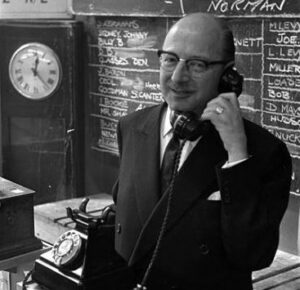 The vast majority of the big bookmakers have an association with real people that started them in the first place. Elsewhere on this site, for example, you can read about those behind William Hill, BetVictor and the lives of Peter and Fred Done, who started Betfred.
The vast majority of the big bookmakers have an association with real people that started them in the first place. Elsewhere on this site, for example, you can read about those behind William Hill, BetVictor and the lives of Peter and Fred Done, who started Betfred.
Few of them are as clearly associated with the company as Joe Coral and the betting shop that bears his surname to this day. With that in mind, it is somewhat ironic that Coral wasn’t even his real name, given that he was born as Joseph Kagarlitsky in the Polish city of Warsaw.
Born into a Jewish family, the Kagarlitskys fled Poland in 1912, hoping to find a better life in the United Kingdom. Seeking to avoid some of the racism that accompanies having a foreign name, they changed their surname to Coral and Joseph became Joe, with the theory being that that that would make it easier for him to get a job. It was a theory that worked, given that he numerous jobs once he left school as a 14-year-old to seek employment. Displaying a flair for mathematics, he would go on to become one of the country’s leading bookmakers.
This is his story.
The Early Years
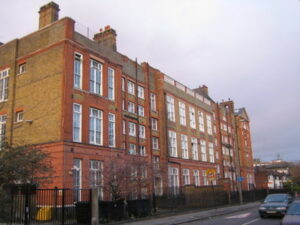
Joseph Kagarlitsky’s father was from Kiev, which had become part of the Tsardom of Russia in 1667 and was still an important part of the Russian empire during the early part of the 20th century. For this reason, Joe actually saw himself as a Russian more than a Pole, in spite of the country he was born in.
There is also evidence of some German in the family, who were Jewish. One of the cousins thought that Kagarlitsky was too outlandish a name to allow them to settle in the United Kingdom when they fled there in 1912. She was reading a book called Coral Island at the time and Coral was a name that ended up sticking.
Joe Coral attended Sigdon Road School in Hackney, leaving when he was 14 in order to start a job as a clerk for a lamp-making firm on Grays Inn Road. It wasn’t that he struggled in school, but the fact that the Great War was beginning, meaning that it was easy for him to ‘play truant’.
Whilst he was working for the lamp-makers, Coral showed an aptitude for mathematics that brought him into contact with bookmakers, resulting in him becoming involved in the illegal street betting that was popular at the time. This saw him sacked from his job for, as he later put it himself, ‘concentrating on the wrong ledger’.
The Move To Becoming A Bookie
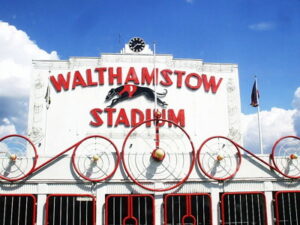
Coral liked betting, placing both his own as well of those of colleagues with street bookmakers. This formed the basis of his decision to become a bookie himself, saying, “Having given this bookie an average of four to five pounds a week for weeks on end, I thought if only I had the pluck to put those bets in my pocket, I’d become a rich man in no time. I then had almost a fiver in the post office – the result of a present when I was bar mitzvahed at 13 – and, I thought, with that sort of capital I could start keeping the bets . . . so I did.”
He got lucky, winning more in bets than what he was earning before becoming ambitious enough to go from floor to floor taking bets. It was that that eventually saw him sacked, then he started working for an advertising agency. When the general strike hit in 1926, work dried up and he spend a lot of his time playing billiards and resumed his bookmaking passion. When greyhound racing arrived in earnest in the same year, Coral’s chance to branch out with his bookmaking hit a new high and sent him towards a bigger stage.
Coral began his life as an on-track bookie at Harringay, White City and Clapton, later making Walthamstow his home when racing resumed there in 1942. He built his capital at a rate of knots and a £5,000 taking at coursing’s Waterloo Cup in 1942 made him the ‘big chap’. Having had run-ins with the law over the years and then facing punters in person on the racecourses, Coral developed a fearlessness as a bookmaker that would stand him in good stead. Indeed, he was regularly at odds with the establishment and nearly didn’t get citizenship in the 1950s as a result.
It wasn’t just the law that Coral caused trouble for. His success on the streets brought him to the attention of Charles Sabini, a gang leader who was known as the ‘king of the racecourse gangs’ and ran an alliance of Italian and Jewish bookmakers. He had extensive connections with the police and politicians, including judges, and could have caused Coral major issues. Having staved them off for a time, Coral was eventually relieved to see Sabini move to Brighton, later being immortalised as the character of Colleoni in Graham Greene’s Brighton Rock.
The First Shops Open
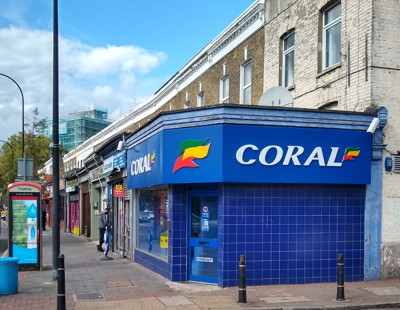
One of the ways in which he ended up on the wrong side of the law was thanks to his off-course cash operation, used to supplement the legal track pitches and credit business that he operated. The good news for Joe Coral came in 1960, when the Gambling Act confirmed that high street bookmakers would be legalised from the first of May 1961.
He was initially cautious of them, having travelled to Dublin and seen ‘dingy offices jammed with unshaven characters hoping for shilling each-way miracles’, trying to imagine who would use the shops in England.
It didn’t take him long to change his mind and by 1962 he had opened his first high street store. He also seemed to predict what would happen in the future, describing the various stages that would come to high street shops, starting with stage one. “A few went straight in and prayed, mainly smaller layers. Then there was stage two, a mushrooming of licences, but stage three is around the corner – the bigger shops system, all well-run, clean, as cheerfully lighted and heated as possible and efficient to the point of fanaticism, friendly too.”
The business soon took off, in no small part thanks to Coral’s decision to make football betting a big part of what he offered in his shops. Lew Cohen worked hard to push the fixed-odds coupon, which was a big earner until a punitive tax of 25% was introduced in 1964. A setback initially, Coral found a way to overcome it and in 1971 initiated a merger with Mark Lane, the first bookmaker to go public on the stock exchange nine years earlier. The move saw Coral shift up to become the country’s third-biggest bookie behind Ladbrokes and William Hill.
A Man With Integrity
 It became something of a saying that punters would have ‘never a quarrel’ if they ‘bet with Coral’. Joe Coral’s son, Nicholas, said that the firm’s success was largely down to his father’s integrity and incredibly high standards. Joe’s willingness to let him family become an important part of the business probably points to that, with his son Bernard being something of a visionary when it came to the development of the shops.
It became something of a saying that punters would have ‘never a quarrel’ if they ‘bet with Coral’. Joe Coral’s son, Nicholas, said that the firm’s success was largely down to his father’s integrity and incredibly high standards. Joe’s willingness to let him family become an important part of the business probably points to that, with his son Bernard being something of a visionary when it came to the development of the shops.
All three of them were important parts of what Coral would go on to become, with Nicholas developing a computer forecast model to stop the industry from being ‘strong-armed by the Tote’.
Joe Coral wasn’t a man that took risks, particularly, though in 1946 he was overheard saying that ‘nobody is successful without an element of luck’. He was responding to the sight of 25/1 Lovely Cottage overtaking 3/1 favourite Prince Regent in the first Grand National since the end of the Second World War, but he could just as easily have been talking about his own career.
From run-ins with the police and needing to dodge members of the London Underground in his youth to running one of the country’s most successful bookmakers isn’t an easy feat, after all.
The Marketing Genius
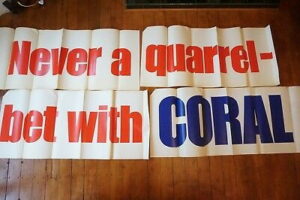
Joe Coral wasn’t just a good mathematician. His time working with the advertising agency in his youth rubbed off, which is why he made one of the conditions of the merger with Lane the fact that the new company would bear the name ‘Coral’. It came at a time when Cyril Stein was eyeing up Coral for a takeover, so was a defensive move as much as anything else. Yet it was the marketing that was such a key to the company’s success. Speaking of the ‘Never a quarrel, bet with Coral’ tagline, famed racehorse specialist John McCririck said, “It was the first bookmaking slogan and a PR man’s dream. It did mean something to punters too.”
Of course, not everyone loved the saying at the time. Terry Leon, who later went on to become an important figure at Ladbrokes, joined Coral in 1969. He said, “Joe’s catchphrase was never easy to live with when you were actually working in his shops!” Yet the man himself was too big a character to argue with, despite only being a touch over five foot tall. He wore a bowler hat that, along with a glass of scotch, became something of a trademark for him; perhaps he realised the importance of having an easily identifiable imagine in an industry of big characters.
He was also one of the first people to realise that they key to success was to get your name known. He regularly advertised in the likes of the Sporting Chronicle and the Sporting Post, which were ostensibly sporting newspapers but actually betting papers. At the time it was legal to accept bets by cheque, thanks to the fact that no cash changed hands, so Coral used the 1950s to obtain a good number of clients via such means. Those same clients will almost certainly have started visiting Coral’s shops once they opened in 1962.
The Sale To Bass
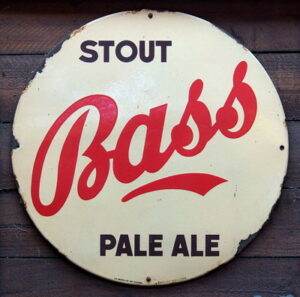
Coral continued to grow with every passing year. By 1979 it had become the Coral Leisure Group, matching the bookmakers with a variety of other businesses including hotels, squash clubs, bingo halls and even Pontins holiday camps.
The company had also begun to open casinos, gaining a casino licence that allowed it operate on more than just the sportsbook front. This, in turn, helped to push it to even newer heights and strengthen in numerous different areas. Joe Coral had started at greyhound tracks and built an empire.
By the end of the 1970s, however, the company had lost all of its casino licences and the group’s profitability was hit badly as a result. This paved the way for an acquisition, with Bass Leisure coming in to buy it and takeover its 650 betting shops, though they retained the Coral name.
Indeed, they also retained the association with Joe Coral, who remained as the President of the company until he died on the 16th of December 1996. He was 92 at the time of his death, having lived an extraordinary life and enjoyed a tremendous career.
Life After Joe’s Death
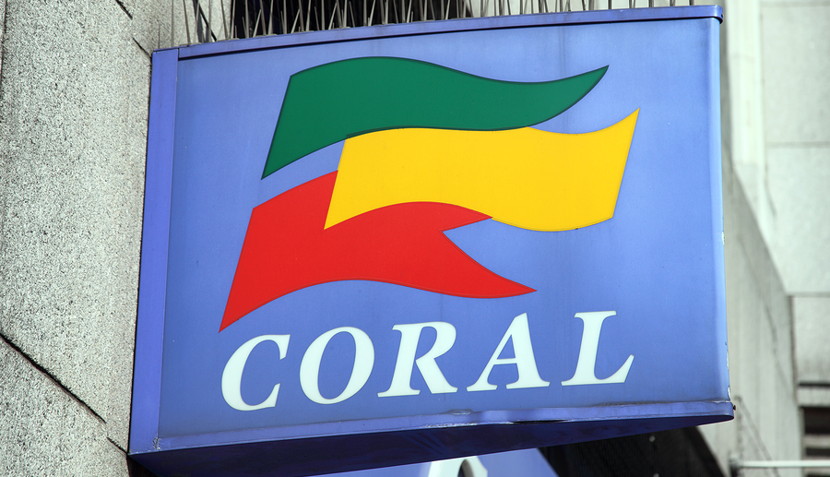
In September 1998, the sale of Coral to the Ladbroke Group was agreed by Bass, who stood to make £363 million in the process. The British government decided that it fell foul of the rules of the Monopolies and Mergers group, however, so the sale fell through.
Instead, with the exception of 59 shops located in Jersey and Ireland, a management buyout was funded by Morgan Grenfell Private Equity. The eventual deal was for £390 million and took place in February of 1999. The new-look Coral moved quickly, paying £7.1 million to buy Eurobet later that year.
Coral Eurobet was itself then acquired by Gala, changing its name to the Gala Coral Group as a result. It was the UK’s third largest bookmaker and bingo operator as a result. Ladbrokes did get their way eventually, buying Gala Coral in November of 2016 and becoming Ladbrokes Coral.
Nothing lasts forever in the world of betting, though, and Ladbrokes Coral was then bought by GVC Holdings, now Entain, in March of 2018 in a deal that was worth as much as £4 billion, once it was sanctioned by the High Court of England and Wales.